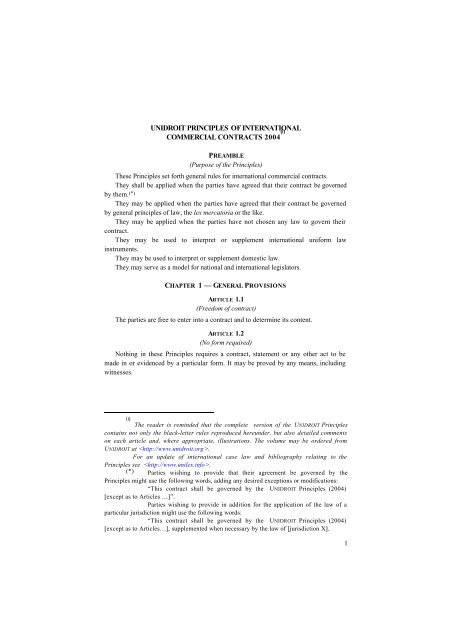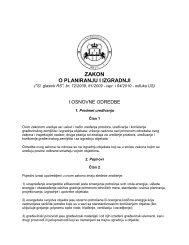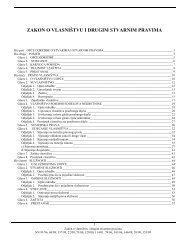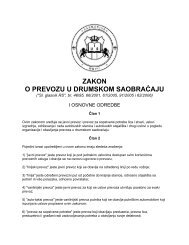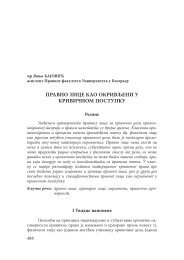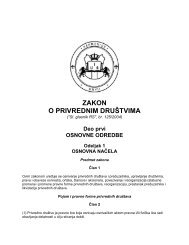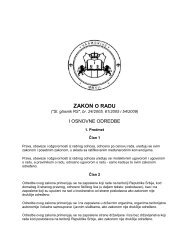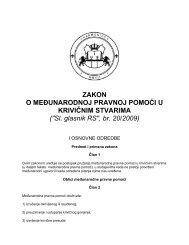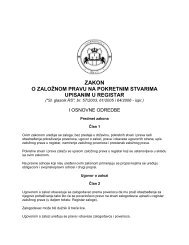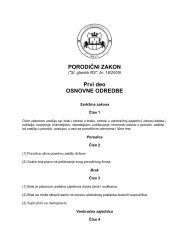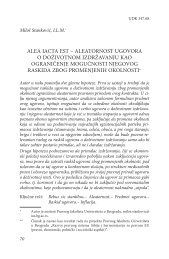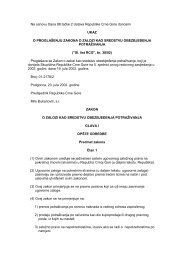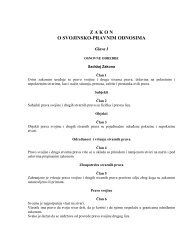unidroit principles ofinternational commercial contracts 2004
unidroit principles ofinternational commercial contracts 2004
unidroit principles ofinternational commercial contracts 2004
You also want an ePaper? Increase the reach of your titles
YUMPU automatically turns print PDFs into web optimized ePapers that Google loves.
UNIDROIT PRINCIPLES OF INTERNATIONALCOMMERCIAL CONTRACTS <strong>2004</strong> (I)PREAMBLE(Purpose of the Principles)These Principles set forth general rules for international <strong>commercial</strong> <strong>contracts</strong>.They shall be applied when the parties have agreed that their contract be governedby them. (*)They may be applied when the parties have agreed that their contract be governedby general <strong>principles</strong> of law, the lex mercatoria or the like.They may be applied when the parties have not chosen any law to govern theircontract.They may be used to interpret or supplement international uniform lawinstruments.They may be used to interpret or supplement domestic law.They may serve as a model for national and international legislators.CHAPTER 1 — GENERAL PROVISIONSARTICLE 1.1(Freedom of contract)The parties are free to enter into a contract and to determine its content.ARTICLE 1.2(No form required)Nothing in these Principles requires a contract, statement or any other act to bemade in or evidenced by a particular form. It may be proved by any means, includingwitnesses.(i)The reader is reminded that the complete version of the UNIDROIT Principlescontains not only the black-letter rules reproduced hereunder, but also detailed commentson each article and, where appropriate, illustrations. The volume may be ordered fromUNIDROIT at .For an update of international case law and bibliography relating to thePrinciples see .(*) Parties wishing to provide that their agreement be governed by thePrinciples might use the following words, adding any desired exceptions or modifications:“This contract shall be governed by the UNIDROIT Principles (<strong>2004</strong>)[except as to Articles …]”.Parties wishing to provide in addition for the application of the law of aparticular jurisdiction might use the following words:“This contract shall be governed by the UNIDROIT Principles (<strong>2004</strong>)[except as to Articles…], supplemented when necessary by the law of [jurisdiction X].1
ARTICLE 1.3(Binding character of contract)A contract validly entered into is binding upon the parties. It can only be modifiedor terminated in accordance with its terms or by agreement or as otherwise provided inthese Principles.ARTICLE 1.4(Mandatory rules)Nothing in these Principles shall restrict the application of mandatory rules, whetherof national, international or supranational origin, which are applicable in accordance withthe relevant rules of private international law.ARTICLE 1.5(Exclusion or modification by the parties)The parties may exclude the application of these Principles or derogate from or varythe effect of any of their provisions, except as otherwise provided in the Principles.ARTICLE 1.6(Interpretation and supplementation of the Principles)(1) In the interpretation of these Principles, regard is to be had to theirinternational character and to their purposes including the need to promote uniformity intheir application.(2) Issues within the scope of these Principles but not expressly settled by themare as far as possible to be settled in accordance with their underlying general <strong>principles</strong>.ARTICLE 1.7(Good faith and fair dealing)(1) Each party must act in accordance with good faith and fair dealing in internationaltrade.(2) The parties may not exclude or limit this duty.ARTICLE 1.8(Inconsistent Behaviour)A party cannot act inconsistently with an understanding it has caused the otherparty to have and upon which that other party reasonably has acted in reliance to itsdetriment.ARTICLE 1.9(Usages and practices)(1) The parties are bound by any usage to which they have agreed and by anypractices which they have established between themselves.(2) The parties are bound by a usage that is widely known to and regularlyobserved in international trade by parties in the particular trade concerned except wherethe application of such a usage would be unreasonable.2
ARTICLE 1.10(Notice)(1) Where notice is required it may be given by any means appropriate to thecircumstances.(2) A notice is effective when it reaches the person to whom it is given.(3) For the purpose of paragraph (2) a notice “reaches” a person when given tothat person orally or delivered at that person’s place of business or mailing address.(4) For the purpose of this article “notice” includes a declaration, demand, requestor any other communication of intention.ARTICLE 1.11(Definitions)In these Principles– “court” includes an arbitral tribunal;– where a party has more than one place of business the relevant “place ofbusiness” is that which has the closest relationship to the contract and its performance,having regard to the circumstances known to or contemplated by the parties at any timebefore or at the conclusion of the contract;– “obligor” refers to the party who is to perform an obligation and “obligee”refers to the party who is entitled to performance of that obligation.– “writing” means any mode of communication that preserves a record of theinformation contained therein and is capable of being reproduced in tangible form.ARTICLE 1.12(Computation of time set by parties)(1) Official holidays or non-business days occurring during a period set by partiesfor an act to be performed are included in calculating the period.(2) However, if the last day of the period is an official holiday or a non-businessday at the place of business of the party to perform the act, the period is extended untilthe first business day which follows, unless the circumstances indicate otherwise.(3) The relevant time zone is that of the place of business of the party setting thetime, unless the circumstances indicate otherwise.CHAPTER 2 — FORMATION AND AUTHORITY OF AGENTSSECTION 1: FORMATIONARTICLE 2.1.1(Manner of formation)A contract may be concluded either by the acceptance of an offer or by conduct ofthe parties that is sufficient to show agreement.ARTICLE 2.1.2(Definition of offer)A proposal for concluding a contract constitutes an offer if it is sufficiently definiteand indicates the intention of the offeror to be bound in case of acceptance.3
ARTICLE 2.1.3(Withdrawal of offer)(1) An offer becomes effective when it reaches the offeree.(2) An offer, even if it is irrevocable, may be withdrawn if the withdrawal reachesthe offeree before or at the same time as the offer.ARTICLE 2.1.4(Revocation of offer)(1) Until a contract is concluded an offer may be revoked if the revocation reachesthe offeree before it has dispatched an acceptance.(2) However, an offer cannot be revoked(a) if it indicates, whether by stating a fixed time for acceptance or otherwise, thatit is irrevocable; or(b) if it was reasonable for the offeree to rely on the offer as being irrevocable andthe offeree has acted in reliance on the offer.ARTICLE 2.1.5(Rejection of offer)An offer is terminated when a rejection reaches the offeror.ARTICLE 2.1.6(Mode of acceptance)(1) A statement made by or other conduct of the offeree indicating assent to anoffer is an acceptance. Silence or inactivity does not in itself amount to acceptance.(2) An acceptance of an offer becomes effective when the indication of assentreaches the offeror.(3) However, if, by virtue of the offer or as a result of practices which the partieshave established between themselves or of usage, the offeree may indicate assent byperforming an act without notice to the offeror, the acceptance is effective when the actis performed.ARTICLE 2.1.7(Time of acceptance)An offer must be accepted within the time the offeror has fixed or, if no time isfixed, within a reasonable time having regard to the circumstances, including the rapidityof the means of communication employed by the offeror. An oral offer must be acceptedimmediately unless the circumstances indicate otherwise.ARTICLE 2.1.8(Acceptance within a fixed period of time)A period of acceptance fixed by the offeror begins to run from the time that the offeris dispatched. A time indicated in the offer is deemed to be the time of dispatch unlessthe circumstances indicate otherwise.4
ARTICLE 2.1.9(Late acceptance. Delay in transmission)(1) A late acceptance is nevertheless effective as an acceptance if without unduedelay the offeror so informs the offeree or gives notice to that effect.(2) If a communication containing a late acceptance shows that it has been sent insuch circumstances that if its transmission had been normal it would have reached theofferor in due time, the late acceptance is effective as an acceptance unless, withoutundue delay, the offeror informs the offeree that it considers the offer as having lapsed.ARTICLE 2.1.10(Withdrawal of acceptance)An acceptance may be withdrawn if the withdrawal reaches the offeror before or atthe same time as the acceptance would have become effective.ARTICLE 2.1.11(Modified acceptance)(1) A reply to an offer which purports to be an acceptance but contains additions,limitations or other modifications is a rejection of the offer and constitutes a counter-offer.(2) However, a reply to an offer which purports to be an acceptance but containsadditional or different terms which do not materially alter the terms of the offerconstitutes an acceptance, unless the offeror, without undue delay, objects to thediscrepancy. If the offeror does not object, the terms of the contract are the terms of theoffer with the modifications contained in the acceptance.ARTICLE 2.1.12(Writings in confirmation)If a writing which is sent within a reasonable time after the conclusion of the contractand which purports to be a confirmation of the contract contains additional ordifferent terms, such terms become part of the contract, unless they materially alter thecontract or the recipient, without undue delay, objects to the discrepancy.ARTICLE 2.1.13(Conclusion of contract dependent on agreementon specific matters or in a particular form)Where in the course of negotiations one of the parties insists that the contract is notconcluded until there is agreement on specific matters or in a particular form, no contractis concluded before agreement is reached on those matters or in that form.ARTICLE 2.1.14(Contract with terms deliberately left open)(1) If the parties intend to conclude a contract, the fact that they intentionallyleave a term to be agreed upon in further negotiations or to be determined by a thirdperson does not prevent a contract from coming into existence.(2) The existence of the contract is not affected by the fact that subsequently(a) the parties reach no agreement on the term; or5
(b) the third person does not determine the term,provided that there is an alternative means of rendering the term definite that isreasonable in the circumstances, having regard to the intention of the parties.6ARTICLE 2.1.15(Negotiations in bad faith)(1) A party is free to negotiate and is not liable for failure to reach an agreement.(2) However, a party who negotiates or breaks off negotiations in bad faith isliable for the losses caused to the other party.(3) It is bad faith, in particular, for a party to enter into or continue negotiationswhen intending not to reach an agreement with the other party.ARTICLE 2.1.16(Duty of confidentiality)Where information is given as confidential by one party in the course ofnegotiations, the other party is under a duty not to disclose that information or to use itimproperly for its own purposes, whether or not a contract is subsequently concluded.Where appropriate, the remedy for breach of that duty may include compensation basedon the benefit received by the other party.ARTICLE 2.1.17(Merger clauses)A contract in writing which contains a clause indicating that the writing completelyembodies the terms on which the parties have agreed cannot be contradicted orsupplemented by evidence of prior statements or agreements. However, such statementsor agreements may be used to interpret the writing.ARTICLE 2.1.18(Modification in a particular form)A contract in writing which contains a clause requiring any modification ortermination by agreement to be in a particular form may not be otherwise modified orterminated. However, a party may be precluded by its conduct from asserting such aclause to the extent that the other party has reasonably acted in reliance on that conduct.ARTICLE 2.1.19(Contracting under standard terms)(1) Where one party or both parties use standard terms in concluding a contract,the general rules on formation apply, subject to Articles 2.1.20 - 2.1.22.(2) Standard terms are provisions which are prepared in advance for general andrepeated use by one party and which are actually used without negotiation with theother party.ARTICLE 2.1.20(Surprising terms)(1) No term contained in standard terms which is of such a character that the otherparty could not reasonably have expected it, is effective unless it has been expresslyaccepted by that party.
(2) In determining whether a term is of such a character regard shall be had to itscontent, language and presentation.ARTICLE 2.1.21(Conflict between standard terms and non-standard terms)In case of conflict between a standard term and a term which is not a standard termthe latter prevails.ARTICLE 2.1.22(Battle of forms)Where both parties use standard terms and reach agreement except on those terms, acontract is concluded on the basis of the agreed terms and of any standard terms whichare common in substance unless one party clearly indicates in advance, or later andwithout undue delay informs the other party, that it does not intend to be bound bysuch a contract.SECTION 2: AUTHORITY OF AGENTSARTICLE 2.2.1(Scope of the Section)(1) This Section governs the authority of a person (“the agent”), to affect the legalrelations of another person (“the principal”), by or with respect to a contract with athird party, whether the agent acts in its own name or in that of the principal.(2) It governs only the relations between the principal or the agent on the onehand, and the third party on the other.(3) It does not govern an agent’s authority conferred by law or the authority of anagent appointed by a public or judicial authority.ARTICLE 2.2.2(Establishment and scope of the authority of the agent)(1) The principal’s grant of authority to an agent may be express or implied.(2) The agent has authority to perform all acts necessary in the circumstances toachieve the purposes for which the authority was granted.ARTICLE 2.2.3(Agency disclosed)(1) Where an agent acts within the scope of its authority and the third party knewor ought to have known that the agent was acting as an agent, the acts of the agent shalldirectly affect the legal relations between the principal and the third party and no legalrelation is created between the agent and the third party.(2) However, the acts of the agent shall affect only the relations between the agentand the third party, where the agent with the consent of the principal undertakes tobecome the party to the contract.7
ARTICLE 2.2.4(Agency undisclosed)(1) Where an agent acts within the scope of its authority and the third partyneither knew nor ought to have known that the agent was acting as an agent, the acts ofthe agent shall affect only the relations between the agent and the third party.(2) However, where such an agent, when contracting with the third party onbehalf of a business, represents itself to be the owner of that business, the third party,upon discovery of the real owner of the business, may exercise also against the latter therights it has against the agent.ARTICLE 2.2.5(Agent acting without or exceeding its authority)(1) Where an agent acts without authority or exceeds its authority, its acts do notaffect the legal relations between the principal and the third party.(2) However, where the principal causes the third party reasonably to believe thatthe agent has authority to act on behalf of the principal and that the agent is actingwithin the scope of that authority, the principal may not invoke against the third partythe lack of authority of the agent.ARTICLE 2.2.6(Liability of agent acting without or exceeding its authority)(1) An agent that acts without authority or exceeds its authority is, failingratification by the principal, liable for damages that will place the third party in the sameposition as if the agent had acted with authority and not exceeded its authority.(2) However, the agent is not liable if the third party knew or ought to haveknown that the agent had no authority or was exceeding its authority.ARTICLE 2.2.7(Conflict of interests)(1) If a contract concluded by an agent involves the agent in a conflict of interestswith the principal of which the third party knew or ought to have known, the principalmay avoid the contract. The right to avoid is subject to Articles 3.12 and 3.14 to 3.17.(2) However, the principal may not avoid the contract(a) if the principal had consented to, or knew or ought to have known of, theagent’s involvement in the conflict of interests; or(b) if the agent had disclosed the conflict of interests to the principal and the latterhad not objected within a reasonable time.ARTICLE 2.2.8(Sub-agency)An agent has implied authority to appoint a sub-agent to perform acts which it isnot reasonable to expect the agent to perform itself. The rules of this Section apply tothe sub-agency.8
ARTICLE 2.2.9(Ratification)(1) An act by an agent that acts without authority or exceeds its authority may beratified by the principal. On ratification the act produces the same effects as if it hadinitially been carried out with authority.(2) The third party may by notice to the principal specify a reasonable period oftime for ratification. If the principal does not ratify within that period of time it can nolonger do so.(3) If, at the time of the agent’s act, the third party neither knew nor ought tohave known of the lack of authority, it may, at any time before ratification, by notice tothe principal indicate its refusal to become bound by a ratification.ARTICLE 2.2.10(Termination of authority)(1) Termination of authority is not effective in relation to the third party unlessthe third party knew or ought to have known of it.(2) Notwithstanding the termination of its authority, an agent remains authorisedto perform the acts that are necessary to prevent harm to the principal’s interests.CHAPTER 3 — VALIDITYARTICLE 3.1(Matters not covered)These Principles do not deal with invalidity arising from(a) lack of capacity;(b) immorality or illegality.ARTICLE 3.2(Validity of mere agreement)A contract is concluded, modified or terminated by the mere agreement of theparties, without any further requirement.ARTICLE 3.3(Initial impossibility)(1) The mere fact that at the time of the conclusion of the contract theperformance of the obligation assumed was impossible does not affect the validity of thecontract.(2) The mere fact that at the time of the conclusion of the contract a party wasnot entitled to dispose of the assets to which the contract relates does not affect thevalidity of the contract.ARTICLE 3.4(Definition of mistake)Mistake is an erroneous assumption relating to facts or to law existing when thecontract was concluded.9
ARTICLE 3.5(Relevant mistake)(1) A party may only avoid the contract for mistake if, when the contract wasconcluded, the mistake was of such importance that a reasonable person in the samesituation as the party in error would only have concluded the contract on materiallydifferent terms or would not have concluded it at all if the true state of affairs had beenknown, and(a) the other party made the same mistake, or caused the mistake, or knew orought to have known of the mistake and it was contrary to reasonable <strong>commercial</strong>standards of fair dealing to leave the mistaken party in error; or(b) the other party had not at the time of avoidance reasonably acted in reliance onthe contract.(2) However, a party may not avoid the contract if(a) it was grossly negligent in committing the mistake; or(b) the mistake relates to a matter in regard to which the risk of mistake wasassumed or, having regard to the circumstances, should be borne by the mistaken party.ARTICLE 3.6(Error in expression or transmission)An error occurring in the expression or transmission of a declaration is considered tobe a mistake of the person from whom the declaration emanated.ARTICLE 3.7(Remedies for non-performance)A party is not entitled to avoid the contract on the ground of mistake if thecircumstances on which that party relies afford, or could have afforded, a remedy fornon-performance.ARTICLE 3.8(Fraud)A party may avoid the contract when it has been led to conclude the contract by theother party’s fraudulent representation, including language or practices, or fraudulentnon-disclosure of circumstances which, according to reasonable <strong>commercial</strong> standards offair dealing, the latter party should have disclosed.ARTICLE 3.9(Threat)A party may avoid the contract when it has been led to conclude the contract by theother party’s unjustified threat which, having regard to the circumstances, is soimminent and serious as to leave the first party no reasonable alternative. In particular, athreat is unjustified if the act or omission with which a party has been threatened iswrongful in itself, or it is wrongful to use it as a means to obtain the conclusion of thecontract.10
ARTICLE 3.10(Gross disparity)(1) A party may avoid the contract or an individual term of it if, at the time of theconclusion of the contract, the contract or term unjustifiably gave the other party anexcessive advantage. Regard is to be had, among other factors, to(a) the fact that the other party has taken unfair advantage of the first party’sdependence, economic distress or urgent needs, or of its improvidence, ignorance,inexperience or lack of bargaining skill, and(b) the nature and purpose of the contract.(2) Upon the request of the party entitled to avoidance, a court may adapt thecontract or term in order to make it accord with reasonable <strong>commercial</strong> standards of fairdealing.(3) A court may also adapt the contract or term upon the request of the partyreceiving notice of avoidance, provided that that party informs the other party of itsrequest promptly after receiving such notice and before the other party has reasonablyacted in reliance on it. The provisions of Article 3.13(2) apply accordingly.ARTICLE 3.11(Third persons)(1) Where fraud, threat, gross disparity or a party’s mistake is imputable to, or isknown or ought to be known by, a third person for whose acts the other party isresponsible, the contract may be avoided under the same conditions as if the behaviouror knowledge had been that of the party itself.(2) Where fraud, threat or gross disparity is imputable to a third person for whoseacts the other party is not responsible, the contract may be avoided if that party knewor ought to have known of the fraud, threat or disparity, or has not at the time ofavoidance reasonably acted in reliance on the contract.ARTICLE 3.12(Confirmation)If the party entitled to avoid the contract expressly or impliedly confirms thecontract after the period of time for giving notice of avoidance has begun to run,avoidance of the contract is excluded.ARTICLE 3.13(Loss of right to avoid)(1) If a party is entitled to avoid the contract for mistake but the other partydeclares itself willing to perform or performs the contract as it was understood by theparty entitled to avoidance, the contract is considered to have been concluded as thelatter party understood it. The other party must make such a declaration or render suchperformance promptly after having been informed of the manner in which the partyentitled to avoidance had understood the contract and before that party has reasonablyacted in reliance on a notice of avoidance.(2) After such a declaration or performance the right to avoidance is lost and anyearlier notice of avoidance is ineffective.11
ARTICLE 3.14(Notice of avoidance)The right of a party to avoid the contract is exercised by notice to the other party.ARTICLE 3.15(Time limits)(1) Notice of avoidance shall be given within a reasonable time, having regard tothe circumstances, after the avoiding party knew or could not have been unaware of therelevant facts or became capable of acting freely.(2) Where an individual term of the contract may be avoided by a party underArticle 3.10, the period of time for giving notice of avoidance begins to run when thatterm is asserted by the other party.ARTICLE 3.16(Partial avoidance)Where a ground of avoidance affects only individual terms of the contract, the effectof avoidance is limited to those terms unless, having regard to the circumstances, it isunreasonable to uphold the remaining contract.ARTICLE 3.17(Retroactive effect of avoidance)(1) Avoidance takes effect retroactively.(2) On avoidance either party may claim restitution of whatever it has suppliedunder the contract or the part of it avoided, provided that it concurrently makesrestitution of whatever it has received under the contract or the part of it avoided or, if itcannot make restitution in kind, it makes an allowance for what it has received.ARTICLE 3.18(Damages)Irrespective of whether or not the contract has been avoided, the party who knew orought to have known of the ground for avoidance is liable for damages so as to put theother party in the same position in which it would have been if it had not concluded thecontract.ARTICLE 3.19(Mandatory character of the provisions)The provisions of this Chapter are mandatory, except insofar as they relate to thebinding force of mere agreement, initial impossibility or mistake.ARTICLE 3.20(Unilateral declarations)The provisions of this Chapter apply with appropriate adaptations to any communicationof intention addressed by one party to the other.12
CHAPTER 4 — INTERPRETATIONARTICLE 4.1(Intention of the parties)(1) A contract shall be interpreted according to the common intention of theparties.(2) If such an intention cannot be established, the contract shall be interpretedaccording to the meaning that reasonable persons of the same kind as the parties wouldgive to it in the same circumstances.ARTICLE 4.2(Interpretation of statements and other conduct)(1) The statements and other conduct of a party shall be interpreted according tothat party’s intention if the other party knew or could not have been unaware of thatintention.(2) If the preceding paragraph is not applicable, such statements and otherconduct shall be interpreted according to the meaning that a reasonable person of thesame kind as the other party would give to it in the same circumstances.ARTICLE 4.3(Relevant circumstances)In applying Articles 4.1 and 4.2, regard shall be had to all the circumstances,including(a) preliminary negotiations between the parties;(b) practices which the parties have established between themselves;(c) the conduct of the parties subsequent to the conclusion of the contract;(d) the nature and purpose of the contract;(e) the meaning commonly given to terms and expressions in the trade concerned;(f) usages.ARTICLE 4.4(Reference to contract or statement as a whole)Terms and expressions shall be interpreted in the light of the whole contract orstatement in which they appear.ARTICLE 4.5(All terms to be given effect)Contract terms shall be interpreted so as to give effect to all the terms rather than todeprive some of them of effect.ARTICLE 4.6(Contra proferentem rule)If contract terms supplied by one party are unclear, an interpretation against thatparty is preferred.13
ARTICLE 4.7(Linguistic discrepancies)Where a contract is drawn up in two or more language versions which are equallyauthoritative there is, in case of discrepancy between the versions, a preference for theinterpretation according to a version in which the contract was originally drawn up.ARTICLE 4.8(Supplying an omitted term)(1) Where the parties to a contract have not agreed with respect to a term which isimportant for a determination of their rights and duties, a term which is appropriate inthe circumstances shall be supplied.(2) In determining what is an appropriate term regard shall be had, among otherfactors, to(a) the intention of the parties;(b) the nature and purpose of the contract;(c) good faith and fair dealing;(d) reasonableness.CHAPTER 5 — CONTENT AND THIRD PARTY RIGHTSSECTION 1: CONTENTARTICLE 5.1.1(Express and implied obligations)The contractual obligations of the parties may be express or implied.ARTICLE 5.1.2(Implied obligations)Implied obligations stem from(a) the nature and purpose of the contract;(b) practices established between the parties and usages;(c) good faith and fair dealing;(d) reasonableness.ARTICLE 5.1.3(Co-operation between the parties)Each party shall cooperate with the other party when such co-operation mayreasonably be expected for the performance of that party’s obligations.ARTICLE 5.1.4(Duty to achieve a specific result. Duty of best efforts)(1) To the extent that an obligation of a party involves a duty to achieve a specificresult, that party is bound to achieve that result.(2) To the extent that an obligation of a party involves a duty of best efforts inthe performance of an activity, that party is bound to make such efforts as would bemade by a reasonable person of the same kind in the same circumstances.14
ARTICLE 5.1.5(Determination of kind of duty involved)In determining the extent to which an obligation of a party involves a duty of bestefforts in the performance of an activity or a duty to achieve a specific result, regardshall be had, among other factors, to(a) the way in which the obligation is expressed in the contract;(b) the contractual price and other terms of the contract;(c) the degree of risk normally involved in achieving the expected result;(d) the ability of the other party to influence the performance of the obligation.ARTICLE 5.1.6(Determination of quality of performance)Where the quality of performance is neither fixed by, nor determinable from, thecontract a party is bound to render a performance of a quality that is reasonable and notless than average in the circumstances.ARTICLE 5.1.7(Price determination)(1) Where a contract does not fix or make provision for determining the price, theparties are considered, in the absence of any indication to the contrary, to have madereference to the price generally charged at the time of the conclusion of the contract forsuch performance in comparable circumstances in the trade concerned or, if no suchprice is available, to a reasonable price.(2) Where the price is to be determined by one party and that determination ismanifestly unreasonable, a reasonable price shall be substituted notwithstanding anycontract term to the contrary.(3) Where the price is to be fixed by a third person, and that person cannot or willnot do so, the price shall be a reasonable price.(4) Where the price is to be fixed by reference to factors which do not exist orhave ceased to exist or to be accessible, the nearest equivalent factor shall be treated as asubstitute.ARTICLE 5.1.8(Contract for an indefinite period)A contract for an indefinite period may be ended by either party by giving notice areasonable time in advance.ARTICLE 5.1.9(Release by agreement)(1) An obligee may release its right by agreement with the obligor.(2) An offer to release a right gratuitously shall be deemed accepted if the obligordoes not reject the offer without delay after having become aware of it.15
SECTION 2: THIRD PARTY RIGHTSARTICLE 5.2.1(Contracts in favour of third parties)(1) The parties (the “promisor” and the “promisee”) may confer by express orimplied agreement a right on a third party (the “beneficiary”).(2) The existence and content of the beneficiary’s right against the promisor aredetermined by the agreement of the parties and are subject to any conditions or otherlimitations under the agreement.ARTICLE 5.2.2(Third party identifiable)The beneficiary must be identifiable with adequate certainty by the contract butneed not be in existence at the time the contract is made.ARTICLE 5.2.3(Exclusion and limitation clauses)The conferment of rights in the beneficiary includes the right to invoke a clause inthe contract which excludes or limits the liability of the beneficiary.ARTICLE 5.2.4(Defences)The promisor may assert against the beneficiary all defences which the promisorcould assert against the promisee.ARTICLE 5.2.5(Revocation)The parties may modify or revoke the rights conferred by the contract on thebeneficiary until the beneficiary has accepted them or reasonably acted in reliance onthem.ARTICLE 5.2.6(Renunciation)The beneficiary may renounce a right conferred on it.CHAPTER 6 — PERFORMANCESECTION 1: PERFORMANCE IN GENERALARTICLE 6.1.1(Time of performance)A party must perform its obligations:(a) if a time is fixed by or determinable from the contract, at that time;(b) if a period of time is fixed by or determinable from the contract, at any timewithin that period unless circumstances indicate that the other party is to choose a time;(c) in any other case, within a reasonable time after the conclusion of the contract.16
ARTICLE 6.1.2(Performance at one time or in instalments)In cases under Article 6.1.1(b) or (c), a party must perform its obligations at onetime if that performance can be rendered at one time and the circumstances do notindicate otherwise.ARTICLE 6.1.3(Partial performance)(1) The obligee may reject an offer to perform in part at the time performance isdue, whether or not such offer is coupled with an assurance as to the balance of theperformance, unless the obligee has no legitimate interest in so doing.(2) Additional expenses caused to the obligee by partial performance are to beborne by the obligor without prejudice to any other remedy.ARTICLE 6.1.4(Order of performance)(1) To the extent that the performances of the parties can be renderedsimultaneously, the parties are bound to render them simultaneously unless thecircumstances indicate otherwise.(2) To the extent that the performance of only one party requires a period of time,that party is bound to render its performance first, unless the circumstances indicateotherwise.ARTICLE 6.1.5(Earlier performance)(1) The obligee may reject an earlier performance unless it has no legitimateinterest in so doing.(2) Acceptance by a party of an earlier performance does not affect the time forthe performance of its own obligations if that time has been fixed irrespective of theperformance of the other party’s obligations.(3) Additional expenses caused to the obligee by earlier performance are to beborne by the obligor, without prejudice to any other remedy.ARTICLE 6.1.6(Place of performance)(1) If the place of performance is neither fixed by, nor determinable from, thecontract, a party is to perform:(a) a monetary obligation, at the obligee’s place of business;(b) any other obligation, at its own place of business.(2) A party must bear any increase in the expenses incidental to performancewhich is caused by a change in its place of business subsequent to the conclusion of thecontract.17
18ARTICLE 6.1.7(Payment by cheque or other instrument)(1) Payment may be made in any form used in the ordinary course of business atthe place for payment.(2) However, an obligee who accepts, either by virtue of paragraph (1) orvoluntarily, a cheque, any other order to pay or a promise to pay, is presumed to do soonly on condition that it will be honoured.ARTICLE 6.1.8(Payment by funds transfer)(1) Unless the obligee has indicated a particular account, payment may be madeby a transfer to any of the financial institutions in which the obligee has made it knownthat it has an account.(2) In case of payment by a transfer the obligation of the obligor is dischargedwhen the transfer to the obligee’s financial institution becomes effective.ARTICLE 6.1.9(Currency of payment)(1) If a monetary obligation is expressed in a currency other than that of the placefor payment, it may be paid by the obligor in the currency of the place for paymentunless(a) that currency is not freely convertible; or(b) the parties have agreed that payment should be made only in the currency inwhich the monetary obligation is expressed.(2) If it is impossible for the obligor to make payment in the currency in whichthe monetary obligation is expressed, the obligee may require payment in the currencyof the place for payment, even in the case referred to in paragraph (1)(b).(3) Payment in the currency of the place for payment is to be made according tothe applicable rate of exchange prevailing there when payment is due.(4) However, if the obligor has not paid at the time when payment is due, theobligee may require payment according to the applicable rate of exchange prevailingeither when payment is due or at the time of actual payment.ARTICLE 6.1.10(Currency not expressed)Where a monetary obligation is not expressed in a particular currency, paymentmust be made in the currency of the place where payment is to be made.ARTICLE 6.1.11(Costs of performance)Each party shall bear the costs of performance of its obligations.ARTICLE 6.1.12(Imputation of payments)(1) An obligor owing several monetary obligations to the same obligee mayspecify at the time of payment the debt to which it intends the payment to be applied.
However, the payment discharges first any expenses, then interest due and finally theprincipal.(2) If the obligor makes no such specification, the obligee may, within a reasonabletime after payment, declare to the obligor the obligation to which it imputes thepayment, provided that the obligation is due and undisputed.(3) In the absence of imputation under paragraphs (1) or (2), payment is imputedto that obligation which satisfies one of the following criteria in the order indicated:(a) an obligation which is due or which is the first to fall due;(b) the obligation for which the obligee has least security;(c) the obligation which is the most burdensome for the obligor;(d) the obligation which has arisen first.If none of the preceding criteria applies, payment is imputed to all the obligationsproportionally.ARTICLE 6.1.13(Imputation of non-monetary obligations)Article 6.1.12 applies with appropriate adaptations to the imputation ofperformance of non-monetary obligations.ARTICLE 6.1.14(Application for public permission)Where the law of a State requires a public permission affecting the validity of thecontract or its performance and neither that law nor the circumstances indicate otherwise(a) if only one party has its place of business in that State, that party shall takethe measures necessary to obtain the permission;(b) in any other case the party whose performance requires permission shall takethe necessary measures.ARTICLE 6.1.15(Procedure in applying for permission)(1) The party required to take the measures necessary to obtain the permissionshall do so without undue delay and shall bear any expenses incurred.(2) That party shall whenever appropriate give the other party notice of the grantor refusal of such permission without undue delay.ARTICLE 6.1.16(Permission neither granted nor refused)(1) If, notwithstanding the fact that the party responsible has taken all measuresrequired, permission is neither granted nor refused within an agreed period or, where noperiod has been agreed, within a reasonable time from the conclusion of the contract,either party is entitled to terminate the contract.(2) Where the permission affects some terms only, paragraph (1) does not applyif, having regard to the circumstances, it is reasonable to uphold the remaining contracteven if the permission is refused.19
ARTICLE 6.1.17(Permission refused)(1) The refusal of a permission affecting the validity of the contract renders thecontract void. If the refusal affects the validity of some terms only, only such terms arevoid if, having regard to the circumstances, it is reasonable to uphold the remainingcontract.(2) Where the refusal of a permission renders the performance of the contract impossiblein whole or in part, the rules on non-performance apply.SECTION 2: HARDSHIPARTICLE 6.2.1(Contract to be observed)Where the performance of a contract becomes more onerous for one of the parties,that party is nevertheless bound to perform its obligations subject to the followingprovisions on hardship.ARTICLE 6.2.2(Definition of hardship)There is hardship where the occurrence of events fundamentally alters theequilibrium of the contract either because the cost of a party’s performance hasincreased or because the value of the performance a party receives has diminished, and(a) the events occur or become known to the disadvantaged party after the conclusionof the contract;(b) the events could not reasonably have been taken into account by the disadvantagedparty at the time of the conclusion of the contract;(c) the events are beyond the control of the disadvantaged party; and(d) the risk of the events was not assumed by the disadvantaged party.ARTICLE 6.2.3(Effects of hardship)(1) In case of hardship the disadvantaged party is entitled to requestrenegotiations. The request shall be made without undue delay and shall indicate thegrounds on which it is based.(2) The request for renegotiation does not in itself entitle the disadvantaged partyto withhold performance.(3) Upon failure to reach agreement within a reasonable time either party mayresort to the court.(4) If the court finds hardship it may, if reasonable,(a) terminate the contract at a date and on terms to be fixed, or(b) adapt the contract with a view to restoring its equilibrium.20
CHAPTER 7 — NON-PERFORMANCESECTION 1: NON-PERFORMANCE IN GENERALARTICLE 7.1.1(Non-performance defined)Non-performance is failure by a party to perform any of its obligations under thecontract, including defective performance or late performance.ARTICLE 7.1.2(Interference by the other party)A party may not rely on the non-performance of the other party to the extent thatsuch non-performance was caused by the first party’s act or omission or by anotherevent as to which the first party bears the risk.ARTICLE 7.1.3(Withholding performance)(1) Where the parties are to perform simultaneously, either party may withholdperformance until the other party tenders its performance.(2) Where the parties are to perform consecutively, the party that is to performlater may withhold its performance until the first party has performed.ARTICLE 7.1.4(Cure by non-performing party)(1) The non-performing party may, at its own expense, cure any nonperformance,provided that(a) without undue delay, it gives notice indicating the proposed manner and timingof the cure;(b) cure is appropriate in the circumstances;(c) the aggrieved party has no legitimate interest in refusing cure; and(d) cure is effected promptly.(2) The right to cure is not precluded by notice of termination.(3) Upon effective notice of cure, rights of the aggrieved party that areinconsistent with the non-performing party’s performance are suspended until the timefor cure has expired.(4) The aggrieved party may withhold performance pending cure.(5) Notwithstanding cure, the aggrieved party retains the right to claim damagesfor delay as well as for any harm caused or not prevented by the cure.ARTICLE 7.1.5(Additional period for performance)(1) In a case of non-performance the aggrieved party may by notice to the otherparty allow an additional period of time for performance.(2) During the additional period the aggrieved party may withhold performance ofits own reciprocal obligations and may claim damages but may not resort to any otherremedy. If it receives notice from the other party that the latter will not perform withinthat period, or if upon expiry of that period due performance has not been made, the ag-21
grieved party may resort to any of the remedies that may be available under thisChapter.(3) Where in a case of delay in performance which is not fundamental theaggrieved party has given notice allowing an additional period of time of reasonablelength, it may terminate the contract at the end of that period. If the additional periodallowed is not of reasonable length it shall be extended to a reasonable length. Theaggrieved party may in its notice provide that if the other party fails to perform withinthe period allowed by the notice the contract shall automatically terminate.(4) Paragraph (3) does not apply where the obligation which has not beenperformed is only a minor part of the contractual obligation of the non-performingparty.ARTICLE 7.1.6(Exemption clauses)A clause which limits or excludes one party’s liability for non-performance or whichpermits one party to render performance substantially different from what the otherparty reasonably expected may not be invoked if it would be grossly unfair to do so,having regard to the purpose of the contract.ARTICLE 7.1.7(Force majeure)(1) Non-performance by a party is excused if that party proves that the nonperformancewas due to an impediment beyond its control and that it could notreasonably be expected to have taken the impediment into account at the time of theconclusion of the contract or to have avoided or overcome it or its consequences.(2) When the impediment is only temporary, the excuse shall have effect for suchperiod as is reasonable having regard to the effect of the impediment on the performanceof the contract.(3) The party who fails to perform must give notice to the other party of theimpediment and its effect on its ability to perform. If the notice is not received by theother party within a reasonable time after the party who fails to perform knew or oughtto have known of the impediment, it is liable for damages resulting from such nonreceipt.(4) Nothing in this article prevents a party from exercising a right to terminate thecontract or to withhold performance or request interest on money due.SECTION 2: RIGHT TO PERFORMANCEARTICLE 7.2.1(Performance of monetary obligation)Where a party who is obliged to pay money does not do so, the other party may requirepayment.22
ARTICLE 7.2.2(Performance of non-monetary obligation)Where a party who owes an obligation other than one to pay money does not perform,the other party may require performance, unless(a) performance is impossible in law or in fact;(b) performance or, where relevant, enforcement is unreasonably burdensome orexpensive;(c) the party entitled to performance may reasonably obtain performance fromanother source;(d) performance is of an exclusively personal character; or(e) the party entitled to performance does not require performance within areasonable time after it has, or ought to have, become aware of the non-performance.ARTICLE 7.2.3(Repair and replacement of defective performance)The right to performance includes in appropriate cases the right to require repair, replacement,or other cure of defective performance. The provisions of Articles 7.2.1 and7.2.2 apply accordingly.ARTICLE 7.2.4(Judicial penalty)(1) Where the court orders a party to perform, it may also direct that this partypay a penalty if it does not comply with the order.(2) The penalty shall be paid to the aggrieved party unless mandatory provisionsof the law of the forum provide otherwise. Payment of the penalty to the aggrievedparty does not exclude any claim for damages.ARTICLE 7.2.5(Change of remedy)(1) An aggrieved party who has required performance of a non-monetary obligationand who has not received performance within a period fixed or otherwise within areasonable period of time may invoke any other remedy.(2) Where the decision of a court for performance of a non-monetary obligationcannot be enforced, the aggrieved party may invoke any other remedy.SECTION 3: TERMINATIONARTICLE 7.3.1(Right to terminate the contract)(1) A party may terminate the contract where the failure of the other party toperform an obligation under the contract amounts to a fundamental non-performance.(2) In determining whether a failure to perform an obligation amounts to a fundamentalnon-performance regard shall be had, in particular, to whether(a) the non-performance substantially deprives the aggrieved party of what it wasentitled to expect under the contract unless the other party did not foresee and could notreasonably have foreseen such result;23
(b) strict compliance with the obligation which has not been performed is ofessence under the contract;(c) the non-performance is intentional or reckless;(d) the non-performance gives the aggrieved party reason to believe that it cannotrely on the other party’s future performance;(e) the non-performing party will suffer disproportionate loss as a result of thepreparation or performance if the contract is terminated.(3) In the case of delay the aggrieved party may also terminate the contract if theother party fails to perform before the time allowed it under Article 7.1.5 has expired.ARTICLE 7.3.2(Notice of termination)(1) The right of a party to terminate the contract is exercised by notice to theother party.(2) If performance has been offered late or otherwise does not conform to thecontract the aggrieved party will lose its right to terminate the contract unless it givesnotice to the other party within a reasonable time after it has or ought to have becomeaware of the offer or of the non-conforming performance.ARTICLE 7.3.3(Anticipatory non-performance)Where prior to the date for performance by one of the parties it is clear that therewill be a fundamental non-performance by that party, the other party may terminate thecontract.ARTICLE 7.3.4(Adequate assurance of due performance)A party who reasonably believes that there will be a fundamental non-performanceby the other party may demand adequate assurance of due performance and may meanwhilewithhold its own performance. Where this assurance is not provided within a reasonabletime the party demanding it may terminate the contract.ARTICLE 7.3.5(Effects of termination in general)(1) Termination of the contract releases both parties from their obligation to effectand to receive future performance.(2) Termination does not preclude a claim for damages for non-performance.(3) Termination does not affect any provision in the contract for the settlement ofdisputes or any other term of the contract which is to operate even after termination.ARTICLE 7.3.6(Restitution)(1) On termination of the contract either party may claim restitution of whateverit has supplied, provided that such party concurrently makes restitution of whatever ithas received. If restitution in kind is not possible or appropriate allowance should bemade in money whenever reasonable.24
(2) However, if performance of the contract has extended over a period of timeand the contract is divisible, such restitution can only be claimed for the period aftertermination has taken effect.SECTION 4: DAMAGESARTICLE 7.4.1(Right to damages)Any non-performance gives the aggrieved party a right to damages either exclusivelyor in conjunction with any other remedies except where the non-performance is excusedunder these Principles.ARTICLE 7.4.2(Full compensation)(1) The aggrieved party is entitled to full compensation for harm sustained as aresult of the non-performance. Such harm includes both any loss which it suffered andany gain of which it was deprived, taking into account any gain to the aggrieved partyresulting from its avoidance of cost or harm.(2) Such harm may be non-pecuniary and includes, for instance, physical sufferingor emotional distress.ARTICLE 7.4.3(Certainty of harm)(1) Compensation is due only for harm, including future harm, that is establishedwith a reasonable degree of certainty.(2) Compensation may be due for the loss of a chance in proportion to theprobability of its occurrence.(3) Where the amount of damages cannot be established with a sufficient degree ofcertainty, the assessment is at the discretion of the court.ARTICLE 7.4.4(Foreseeability of harm)The non-performing party is liable only for harm which it foresaw or couldreasonably have foreseen at the time of the conclusion of the contract as being likely toresult from its non-performance.ARTICLE 7.4.5(Proof of harm in case of replacement transaction)Where the aggrieved party has terminated the contract and has made a replacementtransaction within a reasonable time and in a reasonable manner it may recover thedifference between the contract price and the price of the replacement transaction aswell as damages for any further harm.ARTICLE 7.4.6(Proof of harm by current price)(1) Where the aggrieved party has terminated the contract and has not made areplacement transaction but there is a current price for the performance contracted for, it25
may recover the difference between the contract price and the price current at the timethe contract is terminated as well as damages for any further harm.(2) Current price is the price generally charged for goods delivered or servicesrendered in comparable circumstances at the place where the contract should have beenperformed or, if there is no current price at that place, the current price at such otherplace that appears reasonable to take as a reference.ARTICLE 7.4.7(Harm due in part to aggrieved party)Where the harm is due in part to an act or omission of the aggrieved party or to anotherevent as to which that party bears the risk, the amount of damages shall bereduced to the extent that these factors have contributed to the harm, having regard tothe conduct of each of the parties.ARTICLE 7.4.8(Mitigation of harm)(1) The non-performing party is not liable for harm suffered by the aggrievedparty to the extent that the harm could have been reduced by the latter party’s takingreasonable steps.(2) The aggrieved party is entitled to recover any expenses reasonably incurred inattempting to reduce the harm.ARTICLE 7.4.9(Interest for failure to pay money)(1) If a party does not pay a sum of money when it falls due the aggrieved partyis entitled to interest upon that sum from the time when payment is due to the time ofpayment whether or not the non-payment is excused.(2) The rate of interest shall be the average bank short-term lending rate to primeborrowers prevailing for the currency of payment at the place for payment, or where nosuch rate exists at that place, then the same rate in the State of the currency of payment.In the absence of such a rate at either place the rate of interest shall be the appropriaterate fixed by the law of the State of the currency of payment.(3) The aggrieved party is entitled to additional damages if the non-paymentcaused it a greater harm.ARTICLE 7.4.10(Interest on damages)Unless otherwise agreed, interest on damages for non-performance of non-monetaryobligations accrues as from the time of non-performance.ARTICLE 7.4.11(Manner of monetary redress)(1) Damages are to be paid in a lump sum. However, they may be payable ininstalments where the nature of the harm makes this appropriate.(2) Damages to be paid in instalments may be indexed.26
ARTICLE 7.4.12(Currency in which to assess damages)Damages are to be assessed either in the currency in which the monetary obligationwas expressed or in the currency in which the harm was suffered, whichever is moreappropriate.ARTICLE 7.4.13(Agreed payment for non-performance)(1) Where the contract provides that a party who does not perform is to pay aspecified sum to the aggrieved party for such non-performance, the aggrieved party isentitled to that sum irrespective of its actual harm.(2) However, notwithstanding any agreement to the contrary the specified summay be reduced to a reasonable amount where it is grossly excessive in relation to theharm resulting from the non-performance and to the other circumstances.CHAPTER 8 — SET-OFFARTICLE 8.1(Conditions of set-off)(1) Where two parties owe each other money or other performances of the samekind, either of them ("the first party") may set off its obligation against that of itsobligee ("the other party") if at the time of set-off,(a) the first party is entitled to perform its obligation;(b) the other party’s obligation is ascertained as to its existence and amount andperformance is due.(2) If the obligations of both parties arise from the same contract, the first partymay also set off its obligation against an obligation of the other party which is notascertained as to its existence or to its amount.ARTICLE 8.2(Foreign currency set-off)Where the obligations are to pay money in different currencies, the right of set-offmay be exercised, provided that both currencies are freely convertible and the partieshave not agreed that the first party shall pay only in a specified currency.ARTICLE 8.3(Set-off by notice)The right of set-off is exercised by notice to the other party.ARTICLE 8.4(Content of notice)(1) The notice must specify the obligations to which it relates.(2) If the notice does not specify the obligation against which set-off is exercised,the other party may, within a reasonable time, declare to the first party the obligation towhich set-off relates. If no such declaration is made, the set-off will relate to all theobligations proportionally.27
ARTICLE 8.5(Effect of set-off)(1) Set-off discharges the obligations.(2) If obligations differ in amount, set-off discharges the obligations up to theamount of the lesser obligation.(3) Set-off takes effect as from the time of notice.CHAPTER 9 — ASSIGNMENT OF RIGHTS , TRANSFER OF OBLIGATIONS,ASSIGNMENT OF CONTRACTSSECTION 1: ASSIGNMENT OF RIGHTSARTICLE 9.1.1(Definitions)“Assignment of a right” means the transfer by agreement from one person (the“assignor”) to another person (the “assignee”), including transfer by way of security, ofthe assignor’s right to payment of a monetary sum or other performance from a thirdperson (“the obligor”).ARTICLE 9.1.2(Exclusions)This Section does not apply to transfers made under the special rules governing thetransfers:(a) of instruments such as negotiable instruments, documents of title or financialinstruments, or(b) of rights in the course of transferring a business.ARTICLE 9.1.3(Assignability of non-monetary rights)A right to non-monetary performance may be assigned only if the assignment doesnot render the obligation significantly more burdensome.ARTICLE 9.1.4(Partial assignment)(1) A right to the payment of a monetary sum may be assigned partially.(2) A right to other performance may be assigned partially only if it is divisible,and the assignment does not render the obligation significantly more burdensome.ARTICLE 9.1.5(Future rights)A future right is deemed to be transferred at the time of the agreement, provided theright, when it comes into existence, can be identified as the right to which the assignmentrelates.28
ARTICLE 9.1.6(Rights assigned without individual specification)A number of rights may be assigned without individual specification, provided suchrights can be identified as rights to which the assignment relates at the time of theassignment or when they come into existence.ARTICLE 9.1.7(Agreement between assignor and assignee sufficient)(1) A right is assigned by mere agreement between the assignor and the assignee,without notice to the obligor.(2) The consent of the obligor is not required unless the obligation in thecircumstances is of an essentially personal character.ARTICLE 9.1.8(Obligor’s additional costs)The obligor has a right to be compensated by the assignor or the assignee for anyadditional costs caused by the assignment.ARTICLE 9.1.9(Non-assignment clauses)(1) The assignment of a right to the payment of a monetary sum is effectivenotwithstanding an agreement between the assignor and the obligor limiting orprohibiting such an assignment. However, the assignor may be liable to the obligor forbreach of contract.(2) The assignment of a right to other performance is ineffective if it is contrary toan agreement between the assignor and the obligor limiting or prohibiting the assignment.Nevertheless, the assignment is effective if the assignee, at the time of the assignment,neither knew nor ought to have known of the agreement. The assignor may then be liableto the obligor for breach of contract.ARTICLE 9.1.10(Notice to the obligor)(1) Until the obligor receives a notice of the assignment from either the assignor orthe assignee, it is discharged by paying the assignor.(2) After the obligor receives such a notice, it is discharged only by paying theassignee.ARTICLE 9.1.11(Successive assignments)If the same right has been assigned by the same assignor to two or more successiveassignees, the obligor is discharged by paying according to the order in which the noticeswere received.29
ARTICLE 9.1.12(Adequate proof of assignment)(1) If notice of the assignment is given by the assignee, the obligor may requestthe assignee to provide within a reasonable time adequate proof that the assignment hasbeen made.(2) Until adequate proof is provided, the obligor may withhold payment.(3) Unless adequate proof is provided, notice is not effective.(4) Adequate proof includes, but is not limited to, any writing emanating from theassignor and indicating that the assignment has taken place.ARTICLE 9.1.13(Defences and rights of set-off)(1) The obligor may assert against the assignee all defences that the obligor couldassert against the assignor.(2) The obligor may exercise against the assignee any right of set-off available tothe obligor against the assignor up to the time notice of assignment was received.ARTICLE 9.1.14(Rights related to the right assigned)The assignment of a right transfers to the assignee:(a) all the assignor’s rights to payment or other performance under the contract inrespect of the right assigned, and(b) all rights securing performance of the right assigned.ARTICLE 9.1.15(Undertakings of the assignor)The assignor undertakes towards the assignee, except as otherwise disclosed to theassignee, that:(a) the assigned right exists at the time of the assignment, unless the right is afuture right;(b) the assignor is entitled to assign the right;(c) the right has not been previously assigned to another assignee, and it is freefrom any right or claim from a third party;(d) the obligor does not have any defences;(e) neither the obligor nor the assignor has given notice of set-off concerning theassigned right and will not give any such notice;(f) the assignor will reimburse the assignee for any payment received from theobligor before notice of the assignment was given.SECTION 2: TRANSFER OF OBLIGATIONSARTICLE 9.2.1(Modes of transfer)An obligation to pay money or render other performance may be transferred fromone person (the “original obligor”) to another person (the “new obligor”) either30
a) by an agreement between the original obligor and the new obligor subject toArticle 9.2.3, orb) by an agreement between the obligee and the new obligor, by which the newobligor assumes the obligation.ARTICLE 9.2.2(Exclusion)This Section does not apply to transfers of obligations made under the special rulesgoverning transfers of obligations in the course of transferring a business.ARTICLE 9.2.3(Requirement of obligee’s consent to transfer)The transfer of an obligation by an agreement between the original obligor and thenew obligor requires the consent of the obligee.ARTICLE 9.2.4(Advance consent of obligee)(1) The obligee may give its consent in advance.(2) If the obligee has given its consent in advance, the transfer of the obligationbecomes effective when a notice of the transfer is given to the obligee or when theobligee acknowledges it.ARTICLE 9.2.5(Discharge of original obligor)(1) The obligee may discharge the original obligor.(2) The obligee may also retain the original obligor as an obligor in case the newobligor does not perform properly.(3) Otherwise the original obligor and the new obligor are jointly and severallyliable.ARTICLE 9.2.6(Third party performance)(1) Without the obligee’s consent, the obligor may contract with another personthat this person will perform the obligation in place of the obligor, unless the obligationin the circumstances has an essentially personal character.(2) The obligee retains its claim against the obligor.ARTICLE 9.2.7(Defences and rights of set-off)(1) The new obligor may assert against the obligee all defences which the originalobligor could assert against the obligee.(2) The new obligor may not exercise against the obligee any right of set-offavailable to the original obligor against the obligee.31
ARTICLE 9.2.8(Rights related to the obligation transferred)(1) The obligee may assert against the new obligor all its rights to payment orother performance under the contract in respect of the obligation transferred.(2) If the original obligor is discharged under Article 9.2.5(1), a security granted byany person other than the new obligor for the performance of the obligation isdischarged, unless that other person agrees that it should continue to be available to theobligee.(3) Discharge of the original obligor also extends to any security of the originalobligor given to the obligee for the performance of the obligation, unless the security isover an asset which is transferred as part of a transaction between the original obligorand the new obligor.SECTION 3: ASSIGNMENT OF CONTRACTSARTICLE 9.3.1(Definitions)“Assignment of a contract” means the transfer by agreement from one person (the“assignor”) to another person (the “assignee”) of the assignor’s rights and obligationsarising out of a contract with another person (the “other party”).ARTICLE 9.3.2(Exclusion)This Section does not apply to the assignment of <strong>contracts</strong> made under the specialrules governing transfers of <strong>contracts</strong> in the course of transferring a business.ARTICLE 9.3.3(Requirement of consent of the other party)The assignment of a contract requires the consent of the other party.ARTICLE 9.3.4(Advance consent of the other party)(1) The other party may give its consent in advance.(2) If the other party has given its consent in advance, the assignment of thecontract becomes effective when a notice of the assignment is given to the other party orwhen the other party acknowledges it.ARTICLE 9.3.5(Discharge of the assignor)(1) The other party may discharge the assignor.(2) The other party may also retain the assignor as an obligor in case the assigneedoes not perform properly.(3) Otherwise the assignor and the assignee are jointly and severally liable.32
ARTICLE 9.3.6(Defences and rights of set-off)(1) To the extent that the assignment of a contract involves an assignment ofrights, Article 9.1.13 applies accordingly.(2) To the extent that the assignment of a contract involves a transfer ofobligations, Article 9.2.7 applies accordingly.ARTICLE 9.3.7(Rights transferred with the contract)(1) To the extent that the assignment of a contract involves an assignment ofrights, Article 9.1.14 applies accordingly.(2) To the extent that the assignment of a contract involves a transfer ofobligations, Article 9.2.8 applies accordingly.CHAPTER 10 — LIMITATION PERIODSARTICLE 10.1(Scope of the Chapter)(1) The exercise of rights governed by these Principles is barred by the expirationof a period of time, referred to as “limitation period”, according to the rules of thisChapter.(2) This Chapter does not govern the time within which one party is requiredunder these Principles, as a condition for the acquisition or exercise of its right, to givenotice to the other party or to perform any act other than the institution of legalproceedings.ARTICLE 10.2(Limitation periods)(1) The general limitation period is three years beginning on the day after the daythe obligee knows or ought to know the facts as a result of which the obligee’s right canbe exercised.(2) In any event, the maximum limitation period is ten years beginning on the dayafter the day the right can be exercised.ARTICLE 10.3(Modification of limitation periods by the parties)(1) The parties may modify the limitation periods.(2) However they may not(a) shorten the general limitation period to less than one year;(b) shorten the maximum limitation period to less than four years;(c) extend the maximum limitation period to more than fifteen years.33
ARTICLE 10.4(New limitation period by acknowledgement)(1) Where the obligor before the expiration of the general limitation periodacknowledges the right of the obligee, a new general limitation period begins on the dayafter the day of the acknowledgement.(2) The maximum limitation period does not begin to run again, but may beexceeded by the beginning of a new general limitation period under Art. 10.2(1).ARTICLE 10.5(Suspension by judicial proceedings)(1) The running of the limitation period is suspended(a) when the obligee performs any act, by commencing judicial proceedings or injudicial proceedings already instituted, that is recognised by the law of the court asasserting the obligee’s right against the obligor;(b) in the case of the obligor’s insolvency when the obligee has asserted its rightsin the insolvency proceedings; or(c) in the case of proceedings for dissolution of the entity which is the obligorwhen the obligee has asserted its rights in the dissolution proceedings.(2) Suspension lasts until a final decision has been issued or until the proceedingshave been otherwise terminated.ARTICLE 10.6(Suspension by arbitral proceedings)(1) The running of the limitation period is suspended when the obligee performsany act, by commencing arbitral proceedings or in arbitral proceedings already instituted,that is recognised by the law of the arbitral tribunal as asserting the obligee’s rightagainst the obligor. In the absence of regulations for arbitral proceedings or provisionsdetermining the exact date of the commencement of arbitral proceedings, the proceedingsare deemed to commence on the date on which a request that the right in dispute shouldbe adjudicated reaches the obligor.(2) Suspension lasts until a binding decision has been issued or until theproceedings have been otherwise terminated.ARTICLE 10.7(Alternative dispute resolution)The provisions of Articles 10.5 and 10.6 apply with appropriate modifications toother proceedings whereby the parties request a third person to assist them in theirattempt to reach an amicable settlement of their dispute.ARTICLE 10.8(Suspension in case of force majeure, death or incapacity)(1) Where the obligee has been prevented by an impediment that is beyond itscontrol and that it could neither avoid nor overcome, from causing a limitation period tocease to run under the preceding articles, the general limitation period is suspended so asnot to expire before one year after the relevant impediment has ceased to exist.34
(2) Where the impediment consists of the incapacity or death of the obligee orobligor, suspension ceases when a representative for the incapacitated or deceased partyor its estate has been appointed or a successor has inherited the respective party’sposition. The additional one-year period under paragraph (1) applies accordingly.ARTICLE 10.9(The effects of expiration of limitation period)(1) The expiration of the limitation period does not extinguish the right.(2) For the expiration of the limitation period to have effect, the obligor mustassert it as a defence.(3) A right may still be relied on as a defence even though the expiration of thelimitation period for that right has been asserted.ARTICLE 10.10(Right of set-off)The obligee may exercise the right of set-off until the obligor has asserted theexpiration of the limitation period.ARTICLE 10.11(Restitution)Where there has been performance in order to discharge an obligation, there is noright of restitution merely because the limitation period has expired.35


